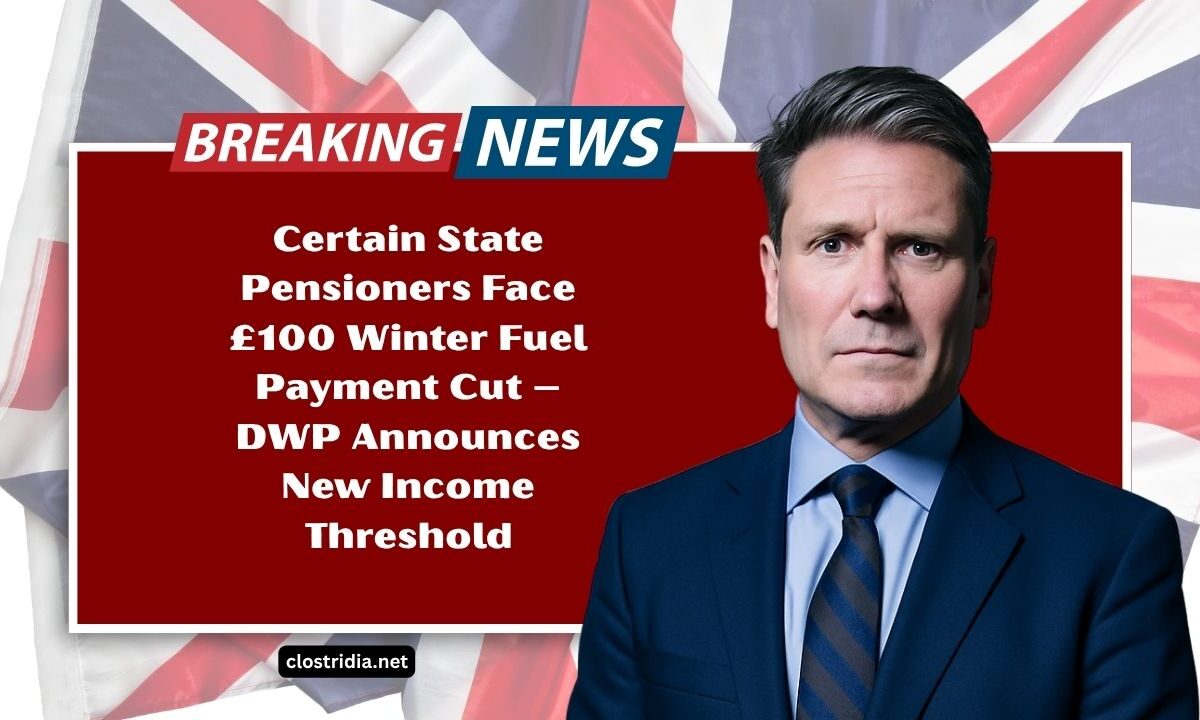The Department for Work and Pensions (DWP) has announced a significant change in the Winter Fuel Payment for certain state pensioners in 2025.
This new policy will reduce the amount paid to some pensioners, cutting their Winter Fuel Payment to as low as £100.
This change comes after a major policy shift, resulting in confusion and concern among pensioners about the future of their fuel support.
What is the Winter Fuel Payment?
The Winter Fuel Payment is a government grant designed to help elderly individuals with the cost of heating their homes during the colder months.
Typically, the payment varies depending on age and household situation. However, recent changes to the income threshold for eligibility have led to a reduction in payouts for certain pensioners, particularly those who are part of a couple.
The New Policy:
Under the newly introduced policy, more than 75% of pensioners in England and Wales will continue to receive the standard £300 Winter Fuel Payment.
However, couples where both individuals are pensioners and have a combined income above £35,000 will see significant cuts in their payments.
- Eligible Single Pensioners: Pensioners living alone or as a couple (with one over 80 years old) will receive £300.
- Couples with combined incomes under £35,000: They will still receive the full payment of £300.
- Couples with one earning over £35,000: The higher-income pensioner will not receive any Winter Fuel Payment, while the lower-income pensioner will receive £100.
Why is the Winter Fuel Payment Cut?
The income threshold for eligibility has been set at £35,000, which is seen as a broadly in line with average earnings.
This means that pensioners with incomes above this threshold will no longer receive the full payment.
In cases where one pensioner earns more than £35,000 and the other earns less, the lower-income pensioner will receive a reduced payment of £100.
This policy change is aimed at focusing resources on pensioners who need it most. However, it has sparked considerable debate about the fairness and effectiveness of the policy, especially for pensioners in dual-income households.
Impact on Pensioners:
The decision to impose a cap on the Winter Fuel Payment is causing significant concern, especially for pensioners in dual-income households.
For example, Mike Hodges, a 72-year-old from Pembrokeshire, shared his frustration with the BBC after his payment was cut last year.
Earning between £35,000-40,000, he found that he did not miss the payment, but he feels that the threshold should be reduced further, arguing that the government could allocate funds to more pressing priorities, such as tackling knife crime and creating more apprenticeships.
Political Reactions:
This move has been heavily criticized by various political leaders. Conservative Party leader Kemi Badenoch described the decision as a humiliating U-turn, pointing out that it will do little to comfort pensioners who were already forced to make difficult choices between heating and eating during the previous winter.
Badenoch’s criticism was aimed at Keir Starmer, the leader of the Labour Party, claiming that the government’s policy shift was a result of poor judgment and a failure to manage the crisis effectively.
On the other hand, Ed Davey, leader of the Liberal Democrats, expressed his relief at the government’s decision to reverse the policy.
Davey emphasized that the decision was a recognition of how disastrous the original policy had been, underscoring the misery caused to pensioners.
Economic Implications:
The decision to cut the Winter Fuel Payment for higher-income pensioners has led to concerns from the Resolution Foundation, a think tank.
They argue that this policy change will introduce new complexities in the tax system, including the cliff-edge situation for those with around £35,000 of income.
This could potentially lead to unintended consequences, such as pensioners being discouraged from earning more or taking up certain jobs due to the withdrawal of benefits.
Additionally, the think tank pointed out that the £450m in reported savings from this policy change could be offset by the increased cost of administering the new means-test and the higher take-up of pension credits by pensioners affected by the cuts.
Winter Fuel Payment Eligibility Breakdown
| Situation | Winter Fuel Payment |
|---|---|
| Single pensioner (over 80 years) | £300 |
| Single pensioner (under 80 years) | £200 |
| Couple (both pensioners, income < £35,000) | £300 |
| Couple (one pensioner earns > £35,000) | £100 |
| Couple (both pensioners, income > £35,000) | £100 |
In conclusion, the recent changes to the Winter Fuel Payment have stirred considerable debate. While the government aims to direct resources to those most in need, the reduction to £100 for some pensioners has raised concerns.
With ongoing political and economic discussions about the fairness of the policy, pensioners remain uncertain about the future of their support during the winter months.
FAQs
Who is eligible for the Winter Fuel Payment in 2025?
Pensioners aged 65 or older and residing in England, Wales, Scotland, and Northern Ireland are eligible, with payments depending on income and household circumstances.
What income threshold determines the payment amount?
The income threshold is set at £35,000, with couples who exceed this threshold receiving a reduced Winter Fuel Payment.
When will the Winter Fuel Payments be made?
Payments are typically made in November or December each year to eligible pensioners.

